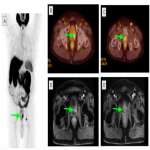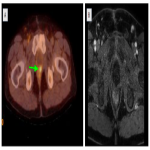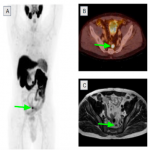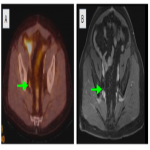Keywords:
Genital / Reproductive system male, Lymph nodes, Nuclear medicine, MR, PET-CT, Outcomes analysis, Radiation therapy / Oncology, Cancer, Metastases
Authors:
L. Saule, M. Radzina, M. Tirane, L. Roznere, L. Zemniece, M. Kalnina, V. Lietuvietis, A. Freimanis, E. Vjaters; Riga/LV
DOI:
10.26044/ecr2021/C-13074
Results
29 patients with biochemical prostate cancer recurrence were prospectively enrolled into the study (mean age: 66.83± 6.76 (range 52 – 84) years). Mean PSA value at the time of the studies were 2.48 ng/ml, median Gleason score was 7 (range 5-9), PSA median doubling time 3.9 months.
The evaluation of local recurrence was based on results of PET/CT and MRI. In our study this included a pathologic 18F-PSMA-1007 uptake in the prostate or prostate bed as reported in 10/29 patients (35 %). In MRI prostate cancer recurrence was documented on 9/29 scans (31%). The mean SUVmax value of recurrent local lesions in PET/CT was 6.9. Against the standard of reference, sensitivity, specificity, accuracy, PPV and NPV for 18F-PSMA-1007 PET/CT were 90.9%, 100%, 96.5%, 100% and 94.7% and for MRI - 81.8%, 100%, 93.1%, 100% and 90.0%, respectively.
Regional lymph nodes were detected more accurately by PET/CT in 48% (n=14/29) patients, while 28% of lymph node metastases were detected on MRI (n=8/29). All of the metastatic lymph nodes were smaller than 1 cm in short axis (mean short axis 0.73 cm). Sensitivity, specificity, accuracy, PPV and NPV for 18F-PSMA-1007 PET/CT were 92.9%, 93.3%, 93.1%, 92.9%, 93.3% and MRI - 57.1%, 100%, 79.3%, 100%, 71.4%, respectively.





